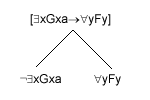Exercise 5.3 - Answers
1 |
(i) |
Yes. A possible result would be: "x[Fxa®Gx] (One
could equally have added "Fc" for instance. The only thing
one could not add would be Fa, because "a" already appears
in the branch). |
||||
|
(ii) |
No.
The formula does not begin with $. |
|||||
|
(iii) |
Yes.
One could add Raa to the right branch. Or one could add Rbb (or
Rcc, or…) to either or both branches. (One could not add Raa to
the left branch, because the branch already contains "a".)
One could also add Fb (say) to the left branch; however there is
in fact never any point in applying the $xj
rule twice to the same formula in the same branch. |
|||||
2 |
(i)
|
The "xj rule (and no other).
|
||||
| (ii) |
The [j®y] rule (and no other). Result:
|
|||||
| (iii) |
The ¬[j®y] rule (and no other). Result: ¬[¬$xFx®P]
|
|||||
| (iv) |
The $xj rule (and no other). Result (say): $x"y[Fx«Ryax] (One
could have used any other name, apart from "a", which
already occurs in the branch.) |
|||||
| (v) |
The "xj rule (and no other). There are two possible results:
"x"y"z[[RxaÙRyb]®Sxyz]] and "x"y"z[[RxaÙRyb]®Sxyz]] |
|||||
| (vi) |
No rule can be applied. The only rule applicable to a formula beginning with " is the "xj rule, and that cannot be applied here, because there is no designator in the branch. |
